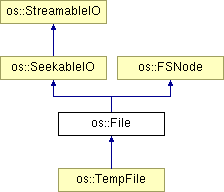
Inheritance diagram for os::File:

Public Types | |
| enum | { DEFAULT_BUFFER_SIZE = 32768 } |
Public Member Functions | |
| File () | |
| Default constructor. | |
| File (const String &cPath, int nOpenMode=O_RDONLY) | |
| Construct a file from a regular path. | |
| File (const Directory &cDir, const String &cName, int nOpenMode=O_RDONLY) | |
| Open a file addressed as a name inside a specified directory. | |
| File (const FileReference &cRef, int nOpenMode=O_RDONLY) | |
| Open a file referred to by a os::FileReference. | |
| File (const FSNode &cNode) | |
| Construct a file from a FSNode. | |
| File (int nFD) | |
| Construct a file object from a open filedescriptor. | |
| File (const File &cFile) | |
| Copy constructor. | |
| virtual | ~File () |
| virtual status_t | FDChanged (int nNewFD, const struct stat &sStat) |
| virtual off_t | GetSize (bool bUpdateCache=true) const |
| virtual ssize_t | Read (void *pBuffer, ssize_t nSize) |
| virtual ssize_t | Write (const void *pBuffer, ssize_t nSize) |
| virtual ssize_t | ReadPos (off_t nPos, void *pBuffer, ssize_t nSize) |
| virtual ssize_t | WritePos (off_t nPos, const void *pBuffer, ssize_t nSize) |
| virtual off_t | Seek (off_t nPos, int nMode) |
| Move the file pointer. | |
| status_t | SetBufferSize (int nSize) |
| Set the size of the files caching buffer. | |
| int | GetBufferSize () const |
| Obtain the files buffer size. | |
| status_t | Flush () |
| Write unwritten data to the underlying file. | |
Classes | |
| class | Private |
| File::File | ( | ) |
| File::File | ( | const String & | cPath, | |
| int | nOpenMode = O_RDONLY | |||
| ) |
cPath. The node must be a regular file or a symlink pointing at a regular file. Anything else will cause and errno_exception(EINVAL) exception to be thrown.| cPath | The file to open. The path can eigther be absolute (starting with "/") or relative to the current working directory. | |
| nOpenMode | Flags controling how the file should be opened. The value should be one of the O_RDONLY, O_WRONLY, or O_RDWR. In addition the following flags can be bitwise or'd in to further control the operation: |
cPath points to a PTY.
| cDir | The directory to use as a base for cPath | |
| cPath | Path relative to cPath. | |
| nOpenMode | Flags controlling how to open the file. See File( const std::string& cPath, int nOpenMode ) for a full description. |
| File::File | ( | const FileReference & | cRef, | |
| int | nOpenMode = O_RDONLY | |||
| ) |
| cRef | Reference to the file to open. | |
| nOpenMode | Flags controlling how to open the file. See File( const std::string& cPath, int nOpenMode ) for a full description. |
| File::File | ( | const FSNode & | cNode | ) |
| cNode | The FSNode to downcast. |
| File::File | ( | int | nFD | ) |
| \return |
| File::File | ( | const File & | cFile | ) |
cFile. The copy and original will have their own file pointers and they will have their own attribute directory iterators (see note). | cFile | The file object to copy. |
| File::~File | ( | ) | [virtual] |
| status_t File::FDChanged | ( | int | nNewFD, | |
| const struct stat & | sStat | |||
| ) | [virtual] |
Reimplemented from os::FSNode.
| off_t File::GetSize | ( | bool | bUpdateCache = true |
) | const [virtual] |
Reimplemented from os::FSNode.
| ssize_t File::Read | ( | void * | pBuffer, | |
| ssize_t | nSize | |||
| ) | [virtual] |
Implements os::StreamableIO.
| ssize_t File::Write | ( | const void * | pBuffer, | |
| ssize_t | nSize | |||
| ) | [virtual] |
Implements os::StreamableIO.
| ssize_t File::ReadPos | ( | off_t | nPos, | |
| void * | pBuffer, | |||
| ssize_t | nSize | |||
| ) | [virtual] |
Implements os::SeekableIO.
| ssize_t File::WritePos | ( | off_t | nPos, | |
| const void * | pBuffer, | |||
| ssize_t | nSize | |||
| ) | [virtual] |
Implements os::SeekableIO.
| off_t File::Seek | ( | off_t | nPos, | |
| int | nMode | |||
| ) | [virtual] |
| status_t File::SetBufferSize | ( | int | nBufferSize | ) |
| nBufferSize | The buffer size in bytes. If the size is set to 0 the file will be unbuffered and each call to Read()/Write() and ReadPos()/WritePos() will translate directly to kernel calls. |
| int File::GetBufferSize | ( | ) | const |
| status_t File::Flush | ( | void | ) |
 1.5.1
1.5.1